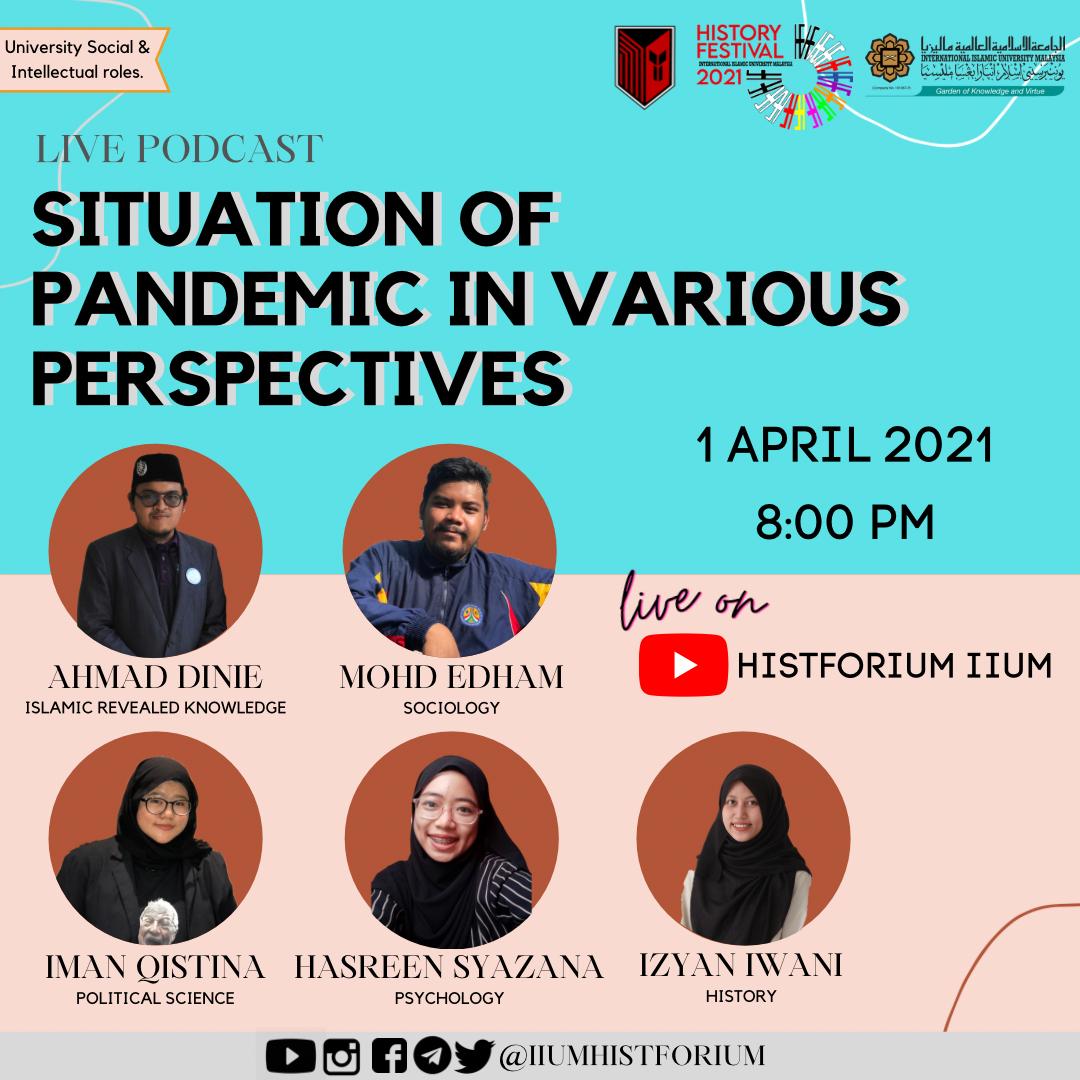By Wala’ Muiz
The COVID-19 pandemic had widely impacted the world and the society from many perspectives that it is perhaps timely to do a little reflection to see if we could learn from the past experience that we have gone through.
In this context, the Secretariat of History and Civilisation (HISTFORIUM) through a discerning and informative live podcast had organised a session titled “Situation of Pandemic in Various Perspectives” last Thursday (1 April) discussing the issues surrounding the pandemic which had hit us for more than a year now.
The event was also held as part of the History Festival 2021.
From historical perspective, HISTFORIUM viewed the session with great significance as a form of education to raise awareness in building strength among the people against the pandemic and its consequences.
The event had brought students from different departments in the Kulliyyah of Islamic Revealed Knowledge and Human Sciences for an exchange of views on the pandemic.
It was felt that the pandemic had not only restricted the movement of people through the Movement Control Order (MCO), but in a way had also brought about greater awareness on how issues arising from the pandemic, especially the impact on business and society in terms of live and livelihood, should be managed and resolved.
œDespite the pandemic limiting social interactions, it has definitely increased political awareness at the same time, said Iman Qistina, a Political Science student.
Iman Qistina pointed out that there should be no fear-mongering about COVID-19 as a political ploy as it is a true phenomenon that needs to be looked into in terms of practicality and rationality.
œPeople are now affected with the phenomenon called ˜Infollution (or (information pollution) where information is polluted and people are no longer able to determine between what is right or what is wrong, said Mohd Edham who is a sociology student.
He also said that the restriction of physical interaction had increased societys dependency on technology where their fear and anxiety are continuously heightened due to misinformation.
“The pandemic is also not something new which concludes how history keeps repeating itself,” the moderator, Harith pointed out following Izyan’s explanation on Spanish flu.
œThis is quite similar with the Spanish flu; with only a few differences where Spanish flu had made someones skin turned blue whereby COVID-19 is more common with catching cough and cold as symptoms, said Izyan Iwani who majors in History and Civilisation.
From an Islamic perspective, the pandemic has helped Muslims to build greater resilience when reminiscing the previous history of plagues such as the Bubonic plague that happened in Palestine, where Muslims managed to overcome despite a few deaths that hit prominent Muslim soldiers such as Khalid al-Walid.
Meanwhile, Ahmad Dinie from IRK department reminded the group about a certain saying of the Prophet. “If you hear of an outbreak of plague in a land, do not enter it; but if the plague breaks out in a place while you are in it, do not leave that place. The prophet’s statement had served as a good reference to encourage the audience, particularly the Muslims, to comply with the Standard Operating Procedure (SOP) to avoid from spreading or contracting the virus.
COVID-19 as a biological nature was seen as a social phenomenon and had worsened the fear and anxiety of people, where public perception needs to be remedied so that people could build better resilience and solidarity against the pandemic, according to Edham.
Hasreen Syazana from Psychology department reminded the audience about the importance of mental health by maintaining healthy activities such as continued working, socialising with friends and families, and practising a good diet.
Seeking help when things become less bearable is also essential, noted Hasreen, where she said PSYCTA peer support team under the Psychology department and IIUM Emotional and Psychosocial Care Team 2020 are most relevant during this time.
Now that the pandemic has vastly spread among the community, the initiative for a vaccine is most welcomed. The rollout of vaccine is now being distributed and people look forward to immunisation.
Ahmad Dinie recapped in regards to the importance of taking the vaccine and how it was founded by the Muslim community that had been made possible for social recognition by Lady of Montague of the United Kingdom during the Ottoman period.
Hence, he felt that there should be no fear in taking the vaccine or people should not base their thoughts on the deviant belief in refusing to take the vaccine such as the possibility of it causing death, when in fact, it can indubitably help reduce the impact of COVID-19 pandemic with the help of immunisation.
Society should be able to realise by now the importance for people to wear a mask and view the practice of physical distancing positively. Who knows there could be another virus in decades to come if we are not careful? This calls for people to pay attention to close cooperation in reducing the COVID-19 cases and preventing another potential outbreak in future. ***
